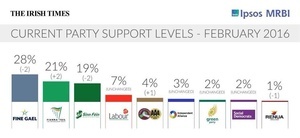 From top: Young Fine Gael members campaign for directly elected mayors at a Town Hall event in Cork earlier this month; Shane Heneghan
From top: Young Fine Gael members campaign for directly elected mayors at a Town Hall event in Cork earlier this month; Shane Heneghan
It’s being billed as a democratic revolution. A handing over of power to the people and the strengthening of local democracy. A quick look at the proposals leaves us with more questions than answers.
The main thrust of the idea is too take power away from local Chief executives in areas such as planning and traffic management and give it to a directly elected mayor.
Cork, Waterford and Limerick already have functioning local authorities that could take this power.
Transferring this power to these assemblies of many directly elected representatives is surely more democratic than transferring it to just one?
The other argument for the proposal is that the directly elected individual would be a “Mr or Mrs Cork, (or Limerick or Waterford)” and be an ambassador for the area on both a national and international stage.
There is no reason to believe that this cosmetic function could not be filled by the existing mayor, already elected by the councils in the respective area. The terms these office holders have is now limited to a year.
We can easily increase their visibility by increasing that term to either two and a half years or five years. Problem solved. No need to reinvent the wheel.
These are the standard, well rehearsed arguments against the directly elected model. What’s peculiarly Irish about these proposals is the asymmetric nature of the plebiscites.
Above all, it would be remiss of me as a proud Tribesman not to ask why Waterford city and county is to be offered a directly elected mayor- but Galway isn’t?
Parochialism aside, the question as to why Urban Ireland is being offered reform and rural Ireland is not must be asked. If they become law, voters in these areas will have one more office holder accountable to them than people living outside them.
Can this be viewed as another snub to the people of rural Ireland? Perhaps its a simple oversight – but I would argue the government has questions to answer as to how the rest of the country will be represented post-plebiscite.
The asymmetric nature of this situation could become apparent quicker than we think. Will Cork hoover up resources at the expense of Galway, Donegal and Mayo as a weak Dublin government lives in fear of a media tantrum from Mayor Roy Keane?
Indeed, speaking of Dublin, isn’t it strange that the one urban agglomeration on the Island that might best use a directly elected mayor if that were useful is being denied it this time?
The greater Dublin area is to be consulted via a citzen’s assembly before it is decided what lies in store for the future of local governance there. Perhaps this is the best example so far of voters being treated differently based on geography.
Local government in Ireland is some of the weakest in Western Europe. It’s laudable to seek to reform it- but not on the back of an envelope. There is already a solid directly elected structure there – we should be seeking to beef up its powers and increase it’s visibility.
Since coming to office in 2011, Fine Gael has been a bit trigger happy with referendums and for the most part this has led to long overdue reforms but these plebiscites strike me as amateurish at best and a hollow distraction at worst.
Shane Heneghan is a Brussels-based writer and academic. Follow Shane on Twitter: @shaneheneghan
Yesterday: Derek Mooney: Mayor Culpa
Michael Taft: Local Election Vacuum







Which ones Cian
The vigorous-looking culchie on the left; I’m the fit-looking one on the right.
jeez, I wish I was that young.
“Young Fine Gael members” what does that sentence make me sad every time I see it…
At the moment, Dublin’s infrastructure is held to ransom by every rural TD that wants a bypass for their hamlet, but from seeing how NIMBY and parochial some Dublin Councillors are to developments in their area, I’m not sure that a directly-elected mayor would be able to solve anything in the end…
Its a pilot so more easily done in small urban centres. Also, Dublin is run by three councils so an elected mayor could be quite complicated and only rolled out if these pilots are a success. Rather than moaning about change, maybe welcome some innovation in the graveyard that is local government?